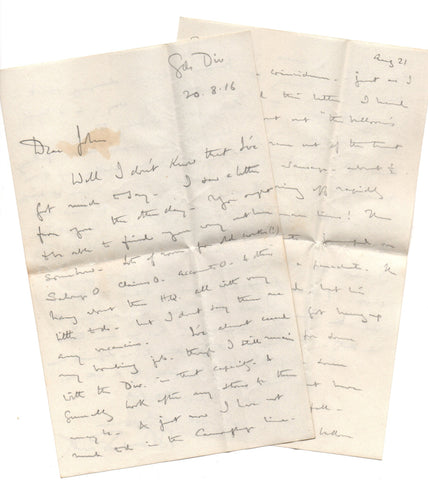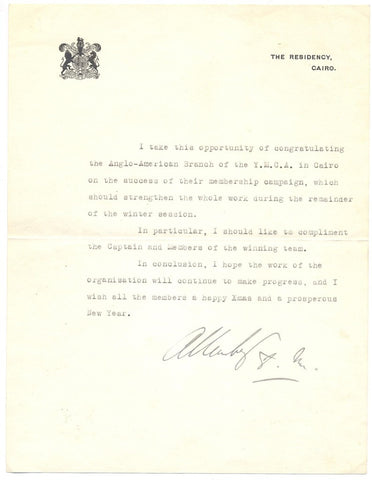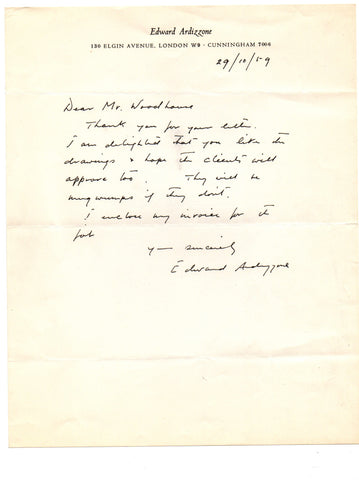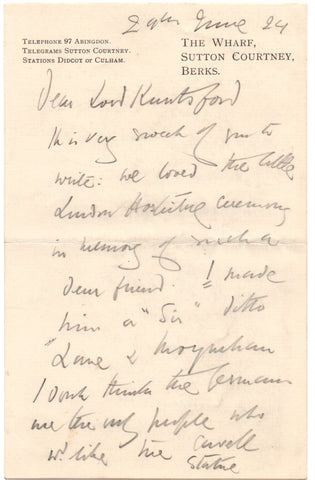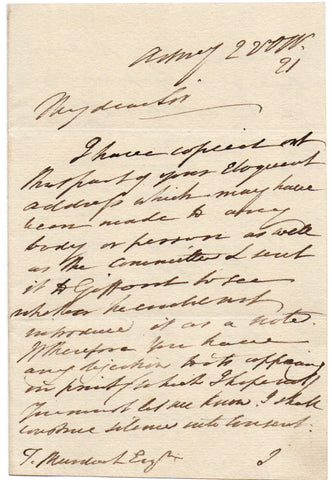BADEN-POWELL, Baden - Fourteen Letters from a Censor to a friend 1914-16
Baden BADEN-POWELL (1860-1937)
Group of fourteen Autograph Letters Signed (“Baden”), to “Dear John” [Capt. Sir John Shelley], four in pencil and one in indelible blue pencil, six of the letters in their envelopes (three of which are marked “Passed by Censor”).
In all, 44pp. 8vo and 1½ pages 4to. Havre, Boulogne, Guards Div. HQ [London], 23 October 1914 – 15 December 1916.
Baden Baden-Powell, younger brother of Robert Baden-Powell, served in Africa, and also in South Africa during the Boer War. By the start of the First World War, he was 54, but soon had a post as censor at Boulogne. The recipient of these letters, Sir John Shelley, 9th Baronet of Michelgrove, was in his mid-sixties by 1914.
23 October 1914, [Havre]: “. . . I am stuck here for the present time . . . We go through all the letters . . . This is rather interesting as we get a good idea of what the Tommies really think of it & though we don’t get much news of the ground movements get . . . interesting anecdotes every day . . .”
4 November 1914, [Havre]: “. . . I heard yesterday, from a Coldstream officer passing through, that our 2nd batt had had a bit of knock with many losses, but I didn’t like to report such details . . . We certainly are having some shocking losses – but what else is to be expected with such a war! . . . If we drive the Germans back Ostend may be opened as a port . . . The Base Commandant has issued an order . . . that officers are to be civil but not familiar to all ladies . . .”
24 November 1914, Havre: “. . . Everybody here – especially those from up country – seem more cockahoop & optimistic than usual . . . This place is really very dull . . . No theatres or music halls or anything of the kind.”
7 December 1914, Havre: “Absolutely nothing to report! . . . We sit on here cursing just as I expect you do at home . . .”
26 December 1914, Havre: “. . . I applied for leave “to visit my old regiment” but they absolutely refused. . . So here I stick – getting very sick of the place . . .”
2 February 1915, Boulogne: “. . . I have changed to Boulogne. . . I am not sure that it is not a case of out of the frying pan into the fire. . . This is one vast hospital. All the principal hotels, casino &c &c are British Hospitals & the streets are occupied by continuous streams of ambulances. I expect I shall find a lot of pals in the hospitals when I get to know my way about. . . Poor old Charles! He dined with me at Havre & I saw him on his way - & now missing! . . .”
8 February 1915, Boulogne: “. . . I have heard about poor old Charles. They were all in a trench & the Germans sent over word to say they had mined the trench & it would be blown up in ½ hour. . . Charles sent back word that they could go to the – They could not of course abandon the trench for such a reason – but in due time the explosion came & from the other trenches they saw the Germans run in & saw them moving some wounded. So that there is just a chance that he may have been taken off wounded. . .”
4 April 1915, Boulogne: “. . . My brother came out the other day, to go up & see French [Sir John French, Commander of the BEF]. So I stuck on to him like a dog . . . After a day at HQ . . . we were sent off in a Rolls-Royce with chauffeur & servant to go all round & see everything. . . We. . . met a lot of other friends. Went into the advanced trenches. Got a shell . . . on the road - watched them shelling our aeroplanes – visited many ruined towns &c &c &c. . . Unfortunately they have absolutely forbidden all cameras out here . . .Mrs. Ashton Hubard [?] suddenly turned up the other day. She had come about Satorius, who died only this morning, of a nasty wound in the stomach. . .”
12 July 1915, Boulogne: “. . . I have at last got a job with the new army, & am coming home in a few days – temporarily – and in command of a K battalion at Romsey. . . I shall be in town for a few days. Guards Club will find me . . .”
9 September 1915, 10 W. Yorks [in pencil]: “. . . I am back in my old wood – never . . . trenches . . . They keep on bursting shells all round us . . . today we had 2 right in among the huts, but the only harm they did was to smash to bits a stretcher . . . We’ve just had the excitement of a German airplane passing over. It was being bombarded from all our anti aircraft guns (eg about 2) & was soon followed by a British aero . . . about this battalion . . . on the whole they are a very good lot. The officers are decidedly mixed – socially – but some are very good sort & most of them wonderfully keen & efficient . . . The corporals are the weak spots. They seem to have no self reliance & no authority.. . .”
26 March 1916, Guards Division HQ [in pencil]: “. . . we are settled down to steady work . . . dug away at . . . trenches &c and just when all complete . . . along comes . . . the RFC, & said they wanted, & must have . . . ground. . . We ask no questions . . .”
29 May 1916, Guards Division HQ [in pencil]: “. . . There are, I believe, no books on bombing, bar 2. One is a most rotten little pamphlet . . . The other is the official work out here which tells a certain amount (of course it does, because I wrote some bits of it) . . . my job will soon come to an end! We’ve taught everybody everything - & those coming on can easily be taught in battalions . . .”
20 August 1916, Guards Division [in pencil]: “. . . Was up in a . . . balloon yesterday . . . most interesting – we were at 2000 ft. & clouds came under us & almost out of sight of the ground. They strap us on to parachutes & say if the string of the balloon breaks, or a Hun airplane comes over, we have got to jump overboard! but I didn’t try that . . . P.S. . . . just as I was finishing this letter I heard someone should out “the balloon’s adrift” – I ran out . . . & saw the old sausage . . . soaring off rapidly towards the German lines! Then one of the occupants jumped out & came down in a parachute. The other apparently tried, but his parachute somehow got hung up & he dangled below for some minutes. Then . . . he must have unstrapped his belt - & fell . . . The balloon got away . . . fired on by our AA guns to destroy it . . . I am awfully sorry about it. The man killed was the one I went up with – a very good chap . . .”
15 December 1916, n.p. [in indelible pencil]: “. . . My jobs here, bombing & camouflage, have both come to an end . . . I don’t know what they will do with me. Do you know of any sort of comfy billet I could fill? You might be able to hear if there is anything going especially connected with bombing or trench warfare . . .”
Delivery
Autographs can be delivered worldwide. Delivery costs are calculated at the time of order and items will be sent by the most appropriate means, depending on your location and the value of the item. This will usually be by Royal Mail Special Delivery within the UK and Royal Mail Tracked outside the UK.
The current delivery charges are:
-
UK:
Royal Mail Special Delivery £9.00
-
Europe:
Europe Royal Mail Tracked £15.00
EU customers should note that, following brexit, local VAT and customs duties may apply to their purchases.USA:
-
Tracked £25
Rest of the World:
-
Rest of the World Tracked £20.00
Export Licensing
Customers should be aware that all letters and documents over 50 years old require an export licence, which may delay delivery by anything from one to three weeks. Signed photographs are not subject to export licence regulations, and can be sent immediately.
There is no charge for the export licence and I will take care of the application, the only inconvenience to you will be the delay.
Authenticity
The authenticity of the letters and documents offered is guaranteed.
Payment
Online sales orders
Payments made via the website are processed by Shopify Inc and can be made using Visa, Mastercard or American Express.
Telephone sales orders
Items may be purchased by phone. Please contact me using the website Contact Form and I will call you within 48 hours to discuss your requirements. Payment for purchases ordered by phone can be paid upon receipt of the invoice and must be paid within 7 days. Phone orders can be paid by cheque (in pounds sterling only) or bank transfer.
Items will be reserved for one week following the order confirmation and will be dispatched either within 7 days after full payment has been received, or after any required export licenses have been granted.
Returns Policy
Should you be in any way dissatisfied with your purchase, items may be returned within six weeks of delivery and a full refund will be made upon receipt of the returned item. The item must be received by Richmond Autographs in the same condition as when dispatched. For full details, please read our Terms and Conditions.
We Also Recommend

